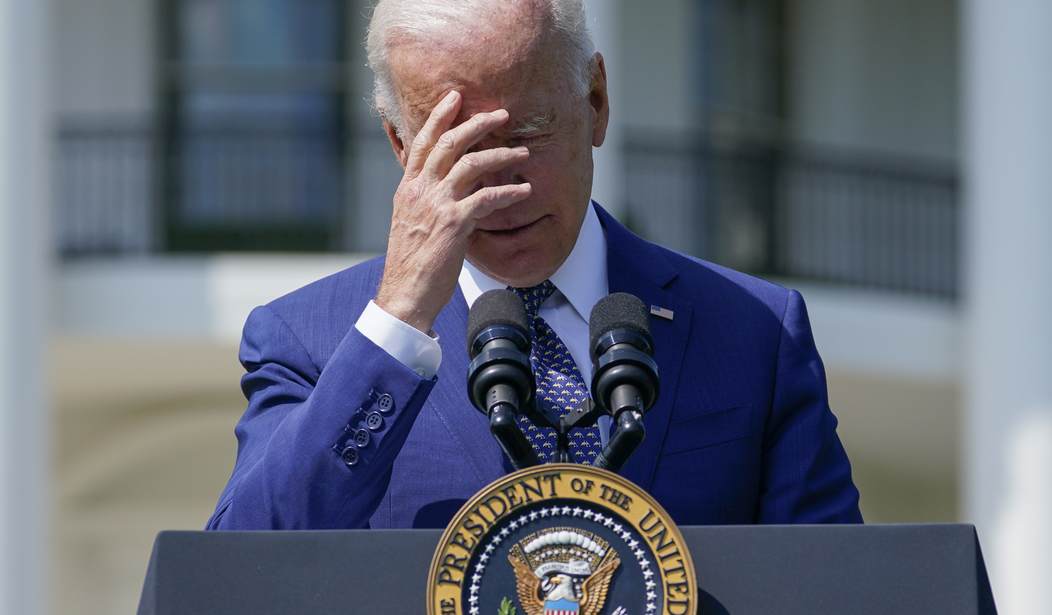Last night's VIP piece addressed how polls indicate President Joe Biden is faring poorly in polls, which is particularly newsworthy in that he's faring poorly among Independents and even with his Democratic base on certain issues. Tonight's will delve into how not only is it going noticed, it's going noticed by friendly outlets, in this case, by the New York Times.
On Friday, Nate Cohn wrote for the New York Times about how "Biden’s Slide With Key Voters: Momentary Blip or Danger Sign?" The subheadline notes that "Polls show women and other reliably Democratic voters have soured on the president’s performance, raising questions about the causes of dissatisfaction."
And, while Cohn from the headline and throughout the article acknowledges it may just be a momentary issue, that doesn't mean it isn't cause for alarm with the potential far reacing and long lasting consequences that could be involved. As he begins his piece, with added emphasis:
President Biden’s approval rating among key Democratic constituencies has declined considerably in recent months, eroding or even reversing decades-long patterns in public opinion.
The as-yet-unanswerable question is whether that slide is a momentary dip — a fluke of a tough run of headlines — or a warning sign of even deeper dissatisfaction among Democratic-leaning voters.
A large number of voters — women, young people and those who are Black or Latino — have all soured on Mr. Biden’s performance, according to polls conducted since the withdrawal of American troops from Afghanistan, even while Mr. Biden has retained more of his support among men, college-educated white voters and older voters.
The shifts could be temporary. Perhaps the enactment of the president’s stalled legislative initiatives in Congress would be enough for the president to renew his reputation with Democratic-leaning voters. But for now, the differences in attitudes about Mr. Biden between men and women, young and old, Hispanic and non-Hispanic and perhaps even white and Black have grown unusually small. The pattern defies the decades-long tendency for Democrats to fare better among women than men, and among the young than the old.
What makes Cohn's piece so fascinating is not just that it provides examples of even the leftwing mainstream media acknowledging how poorly Biden is doing. Polls are usually cited, as last night's VIP piece did. This is about trends for the Democratic Party overall, though, and what they need to take from this.
For all the excitement some people have about Trump being out and Biden being in, it turns out the reality of 2020 is that the election wasn't so hot for Democrats after all.
Recommended
Cohn also writes:
But Mr. Biden’s weakness could also be interpreted as a continuation of electoral trends that surprised and disappointed Democrats in November. Mr. Biden fared unexpectedly poorly last year among many of the same groups he is struggling with now. It raises the more alarming possibility for Democrats that recent events have revealed a broader problem — they are losing support among voting groups they generally take for granted.
Yes, Democrats are in control of the White House, the Senate, and the House of Representatives. The American people don't even think Biden will make it to 2024 to run for re-election, though. Democrats are only in control of the 50-50 Senate because Vice President Kamala Harris serves as a tie breaking vote, and the House is similarly under Democratic control by single digits.
In 2020, no Republican incumbent lost a seat in the House, and there was actually a Republican gain of 14 seats.
History is very much on the GOP's side to take back the House in 2022, because the president's party usually loses seats in the midterm election, and especially because Biden's approval rating has been under 50 percent.
This is a great image from The NY Times, Biden is in free fall. The group that moved the least are college educated whites, but I think that’s a problem with polls and not accurate pic.twitter.com/dTfE7yHjQm
— Ryan James Girdusky (@RyanGirdusky) October 1, 2021
For all of the deep dive analysis Cohn provides, he admits that these trends don't even have much of an obvious explanation.
Cohn does mention the midterms, as is olnly fitting. As his piece closed with:
Even if Mr. Biden could rejuvenate his support among traditional Democratic constituencies, weakness among white voters without a degree would still be a serious challenge for Democrats heading into the midterm election next year, when the president’s party usually suffers a drubbing.
The latest polls do not do much to reassure Democrats that they are poised to defy that trend. In the history of modern polling, Mr. Biden’s ratings have sunk lower than the ratings for all but two presidents at similar points in their terms — Gerald Ford and Donald Trump.
























